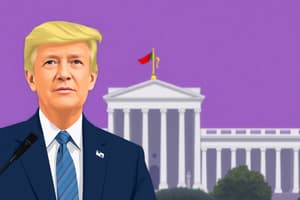Podcast
Questions and Answers
Why do you think the constitution sets 40 years old as a criterion for the selection of the Presidency?
Why do you think the constitution sets 40 years old as a criterion for the selection of the Presidency?
What is one of the powers of the Executive Department in the Philippines?
What is one of the powers of the Executive Department in the Philippines?
What is one of the qualifications for a person to be elected as President of the Philippines?
What is one of the qualifications for a person to be elected as President of the Philippines?
What is the role of the Commission on Appointments in the Philippines?
What is the role of the Commission on Appointments in the Philippines?
Signup and view all the answers
In which type of government is the executive power vested in the President?
In which type of government is the executive power vested in the President?
Signup and view all the answers
What is the role of the President in the military?
What is the role of the President in the military?
Signup and view all the answers
What is the significance of the veto power of the Executive?
What is the significance of the veto power of the Executive?
Signup and view all the answers
What is the main authority of the leader, as described by John Locke?
What is the main authority of the leader, as described by John Locke?
Signup and view all the answers
Who is the head of state in a monarchical government?
Who is the head of state in a monarchical government?
Signup and view all the answers
In which instance can the President declare martial law?
In which instance can the President declare martial law?
Signup and view all the answers
What can be inferred about the significance of experience in the selection of the President?
What can be inferred about the significance of experience in the selection of the President?
Signup and view all the answers
What is the role of the executive in a government?
What is the role of the executive in a government?
Signup and view all the answers
Who is chosen by means of election in the Philippines?
Who is chosen by means of election in the Philippines?
Signup and view all the answers
What is the 'primus inter pares principle'?
What is the 'primus inter pares principle'?
Signup and view all the answers
What is the power of the President to declare a state of emergency?
What is the power of the President to declare a state of emergency?
Signup and view all the answers
What is the main manager and leader of all governmental offices and divisions?
What is the main manager and leader of all governmental offices and divisions?
Signup and view all the answers
Study Notes
Nature of Executive Department
- The executive department is the branch of government responsible for managing political and ceremonial affairs.
- In Presidential governments, executive power is vested in the President, while in monarchies, the monarch and Prime Minister share executive functions.
- The executive is responsible for executing laws and implementing state policies, using their signatory powers.
- The executive is also the manager and leader of all governmental offices and divisions.
The Doctrine of Prerogative
- The doctrine of prerogative was popularized by John Locke, who defined it as the main authority of the leader, sometimes transcending the law.
- In the Philippines, the President has the power to appoint, grant reprieve, commutation, and pardon to criminals, and declare a state of emergency.
Qualifications of Chief Executive
- The qualifications of the chief executive vary by country and are set by the constitution.
- In Great Britain, the monarch is chosen based on family lineage, while the Prime Minister is chosen from among members of the legislature.
- In the Philippines, the President is elected through popular vote.
- To be eligible to become President of the Philippines, a person must be a natural-born citizen, a registered voter, able to read and write, at least 40 years old, and a resident of the Philippines for at least 10 years.
- The Vice-President has the same qualifications as the President.
Powers and Functions of Executive Department
- The executive department has several powers and functions, including:
- Appointing power: the executive appoints cabinet members based on merit, qualification, or loyalty.
- Diplomatic power: the executive appoints official representatives to other countries.
- Military power: the President is the commander-in-chief of the armed forces and can declare martial law to suppress lawless elements, invasion, and rebellion.
- Veto power: the executive can veto bills approved by the legislature.
Studying That Suits You
Use AI to generate personalized quizzes and flashcards to suit your learning preferences.
Description
Learn about the executive department's role in government, its functions, and the powers vested in the President, monarch, and Prime Minister.




